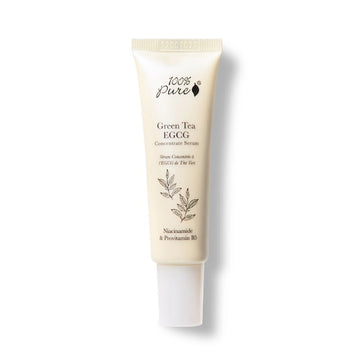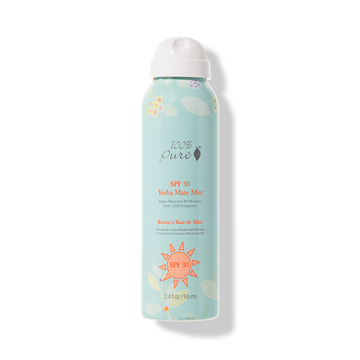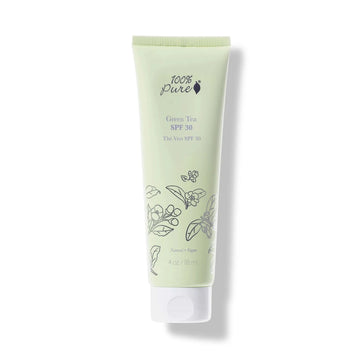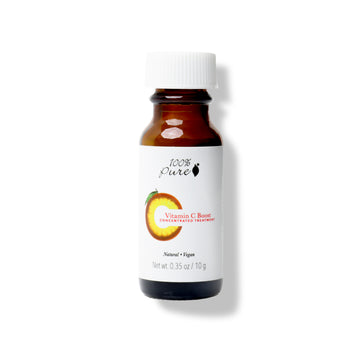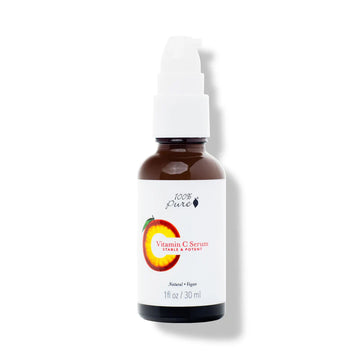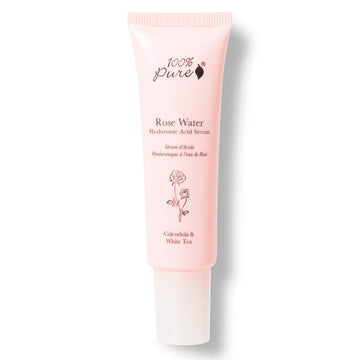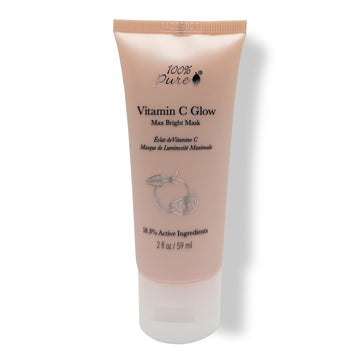Get the lowdown on when to apply vitamin C serum
Written by: 100% PURE ®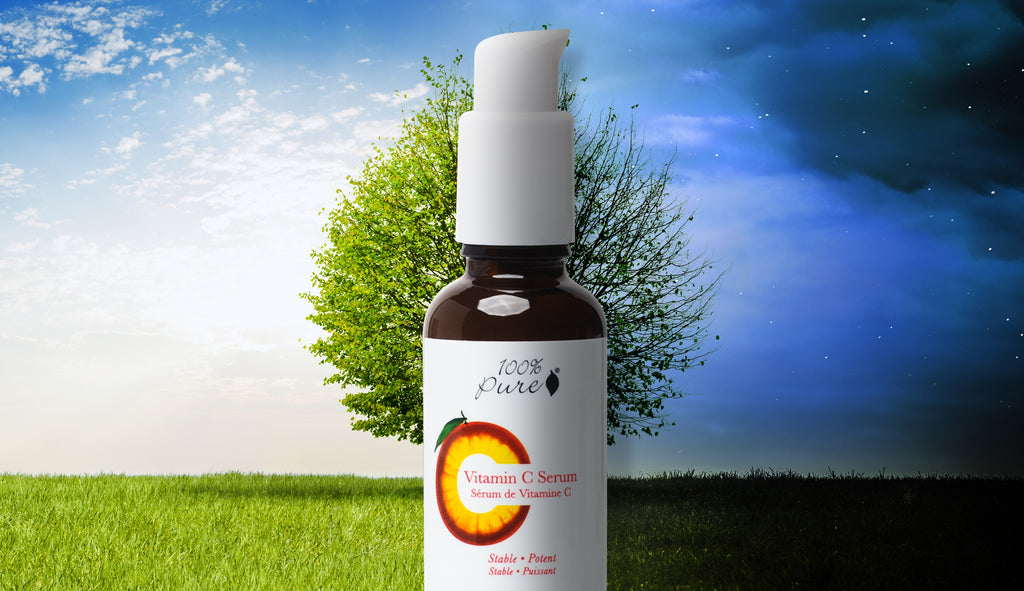
Is this the actual riddle of the Sphinx? It might as well be, with how many people it befuddles on a daily basis. This question has been circulated more widely as of late, as vitamin C serums continue to trend in the skin care market.
There’s a reason why vitamin C serums have become so popular: Vitamin C is a potent antioxidant with incredible benefits for skin health. It can boost your circulation, brighten your skin, help to heal surface damage, stimulate collagen production, and even scavenge free radicals to prevent the onset of fine lines and wrinkles. The best news is that many dermatologists recommend vitamin C serum for all skin types.
Though a natural vitamin C serum could undoubtedly take your skin care routine to the next level, there’s some confusion surrounding the correct use of these serums. Specifically, there’s a bit of controversy in the skin care world over whether vitamin C serum should be used in the morning, in the evening, or both. Let’s discuss when to apply vitamin C serum and vitamin C serum benefits!
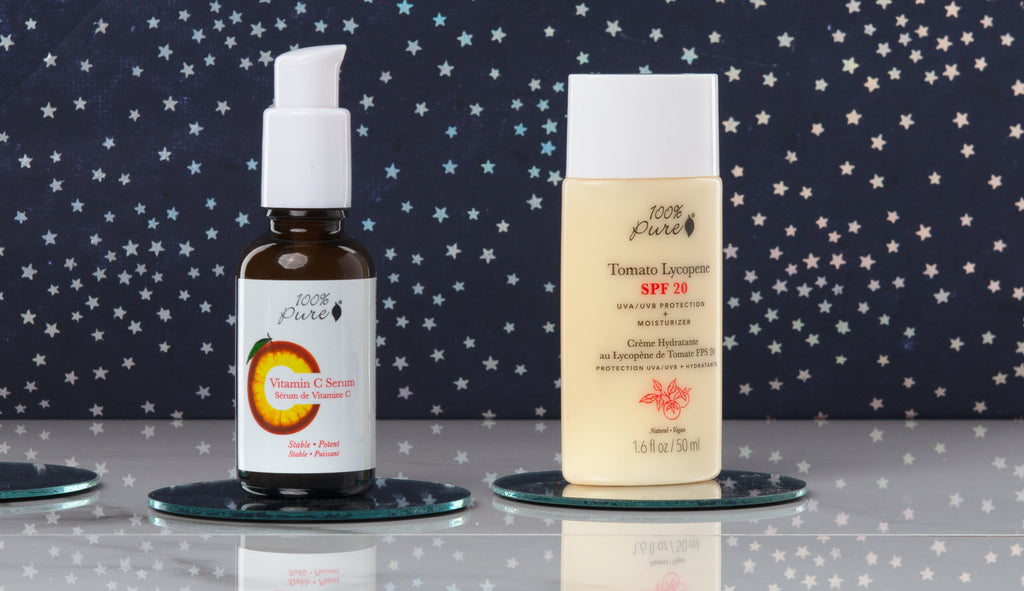
A.M.
When looking into when to apply vitamin C serum, is morning the right time? The light texture and fast-absorbing properties of serums make them ideal for layering underneath moisturizer, makeup, and other products. This, along with vitamin C serum benefits for skin, is probably why many of us are tempted to use our vitamin C serums during the day.
Generally speaking, when it comes to when to apply vitamin C serum, these kinds of serums should be safe and suitable for daytime use. Some dermatologists recommend applying a vitamin C serum in the morning in order to prevent damage from free radicals that can occur throughout the day. If you do choose to use your serum in the morning, you’ll need to follow up with a layer of broad spectrum sunscreen, with an SPF of 30 or higher.
Now, hang on a minute – if you have sensitive skin and you’re wondering when to apply vitamin C serum, you might want to steer clear of vitamin C serum during daytime hours. In some cases, higher concentrations of vitamin C could make sensitive skin more prone to irritation and sunburn.
If your skin tends to be reactive to products that contain retinol and similar ingredients, we recommend using your vitamin C serum as a PM-only product.
P.M.
With regard to when to apply vitamin C serum, is nighttime the right time? Even if you don’t have sensitive skin, we recommend that all skin types use their vitamin C serum before bed. Your body undergoes its natural repair process while you’re asleep, and the vitamin C will make its strongest impact on your skin during this time. It’ll also absorb into your skin most effectively after you’ve cleansed and exfoliated, so it makes sense to apply it during your nighttime routine.
When you use your vitamin C serum during the night, you’ll also avoid the risk of photosensitivity, which can occur in some cases with daytime use.
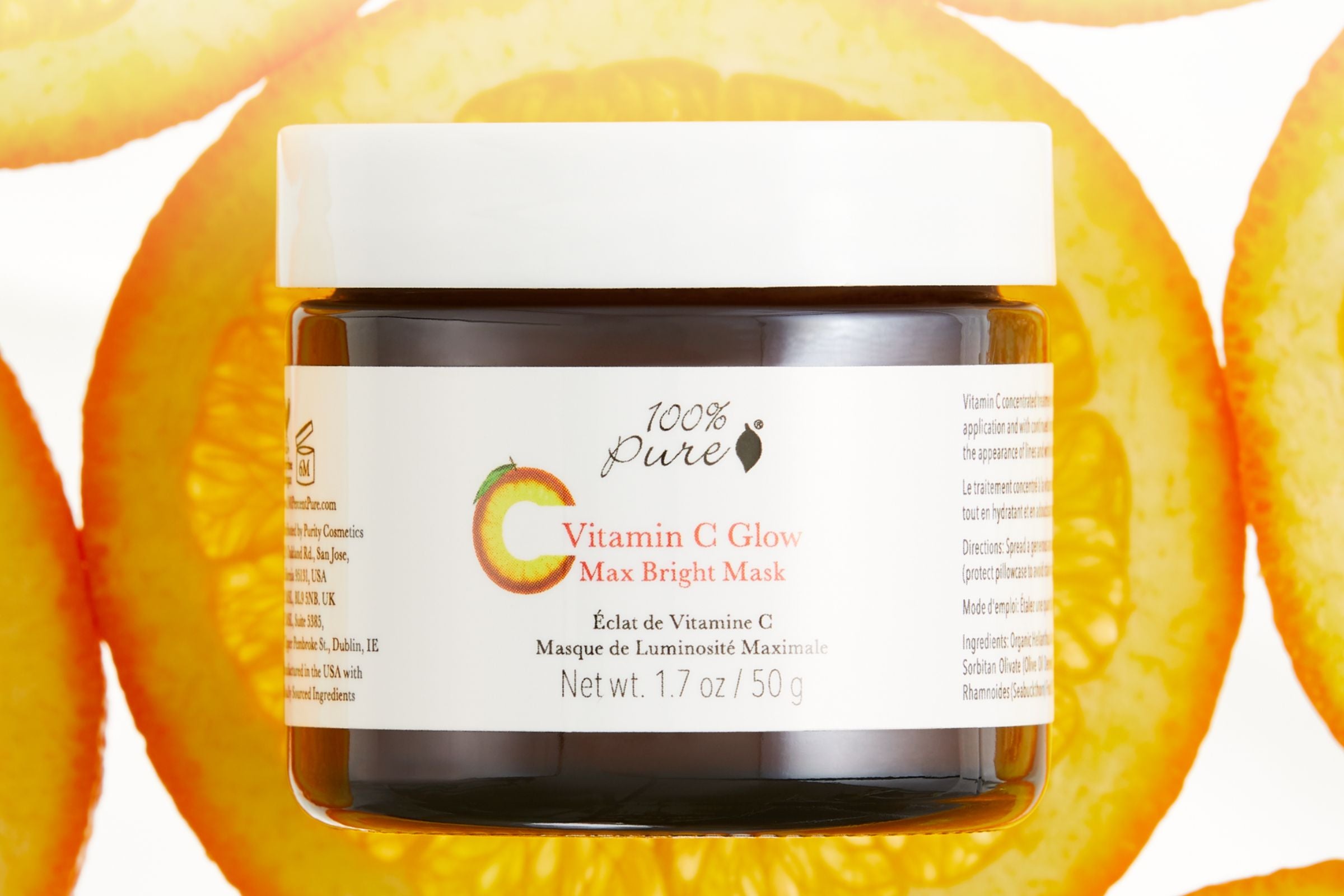
When you’re looking to take your anti-aging regimen to the next level, there are few better ways to do so than through the use of a powerful, antioxidant-loaded face mask.
Our NEW Vitamin C Glow Max Bright Mask packs a punch against aging factors with skin-correcting bakuchiol, CoQ10, Vitamin E, and other illuminating ingredients to turn up the glow and transform complexion. You’ll notice the instant brightening and softening results with the very first use, while experiencing the collagen-boosting benefits over time.
As with any potent vitamin concentration used at night, it’s wise to follow with SPF before you step outside the following morning.
A.M. and P.M.
The directions for when to apply vitamin C serums will tell you to use only a drop or two of the product; this is because a little bit of vitamin C serum goes a long way. There’s a limit to how much vitamin C your skin can absorb in a day, so any extra product that you use will go to waste.
In summary: if you know you’re using a product with a higher concentration of vitamin C and wondering when to apply vitamin C serum, once-per-day application is all you need. On the other hand, if you’re using a gentler product with a lower concentration of vitamin C, you might see extra benefits from applying it twice per day, both AM and PM.

Many people wonder when to apply vitamin C serum with regard to the seasons. While using vitamin C as part of your skin care regimen is smart year-round, it’s especially important to apply it in winter.
As we mentioned earlier, higher concentrations of vitamin C during the daytime could make sensitive skin more prone to irritation and sunburn – and those effects can become magnified when you add in hot summer sun. Since vitamin C can act as a photosensitizer, it can make the skin more susceptible when exposed to the sun. So, make sure to pair it with an SPF.
Vitamin C serum is also especially important in winter because of the environmental protection it offers. Vitamin C supports the prevention of skin barrier impairment that can happen during the harsh conditions of winter.
Free radicals can damage the skin’s natural barrier, stripping vital, healthy oils from its surface. Harsh winter weather conditions can contribute to skin being ultra-dry and dehydrated. So, it’s especially important to use vitamin C serum to fight free radicals and help replenish your skin’s natural barrier during winter.
We recommend our Vitamin C Serum for day or nighttime use, but it really comes down to your skin type and sensitivity level. However if you do wear it during the day, you should wear it under a broad spectrum SPF. Studies have shown that pairing vitamin C with sun protection may actually boost free radical defense!
Our formula includes both vitamin C and antioxidant vitamin E to help heal and rejuvenate skin. It also features alpha lipoic acid to promote cellular regeneration and gently resurface skin, and green apple to boost the vibrance of your complexion.
When it comes to PM only vitamin C serum, the Multi-Vitamin + Antioxidants Serum is formulated to heal, restore, and renew your skin while you sleep. This is due to a higher percentage of the vitamin, and the fact that it’s blended with other photosensitive ingredients like retinol.
When you’re purchasing a vitamin C serum, make sure to check the list of ingredients on the packaging in order to understand what impact the product will have on your skin. If the serum contains alpha hydroxy acids or other gentle exfoliants, we recommend relegating it to nighttime use.
If you’re looking for an all-day serum to wear under sunscreen or makeup, start with a hydrating serum that’s gentle on sensitive skin. Another daytime option is to opt for a green tea concentrated serum, which will provide free radical-neutralizing benefits to protect and fortify skin from environmental damage.
We recommend that beauty lovers use our Vitamin C Serum after cleansing, exfoliating, masking, and/or toning — but always before moisturizing. All you have to do is apply a couple pumps of serum to clean fingers, and gently press the product evenly over damp skin.
Always allow your serum to absorb for 60-90 seconds, to ensure it has time to penetrate the skin. Follow up with a moisturizer to lock in the goodness of your serum, and bolster your skin’s protective lipid barrier.
In order to ensure that you’re using your products as safely as possible, we recommend keeping an eye on their ingredients lists and percentages. If you’re not sure how potent the percentage of a vitamin is in your serum, call the company – they’ll tell you). This will help you understand what effect they might have on your skin, especially when they’re exposed to sunlight.
If in doubt about the impact that a product may have, we recommend sticking to PM use only! Vitamin C serum can brighten, condition, and restore your skin — whether it’s used during the daytime or at night.
- Tags: October-2022, Skin Care, skincare
We carefully hand-select products based on strict purity standards, and only recommend products we feel meet this criteria. 100% PURE™ may earn a small commission for products purchased through affiliate links.
The information in this article is for educational use, and not intended to substitute professional medical advice, diagnosis, or treatment and should not be used as such.


